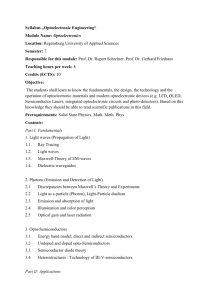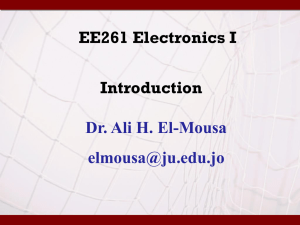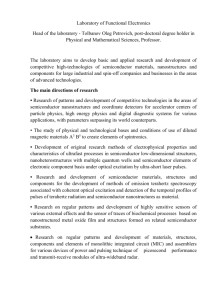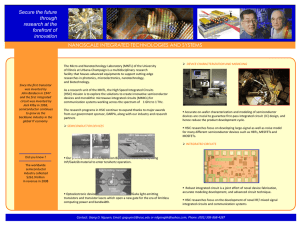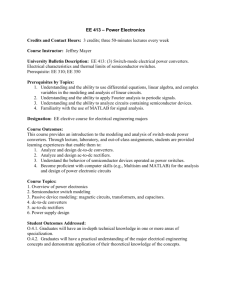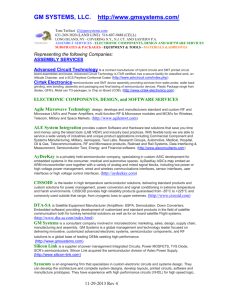INSTITUTE OF MICROELECTRONICS TEL: 886-6-275
advertisement
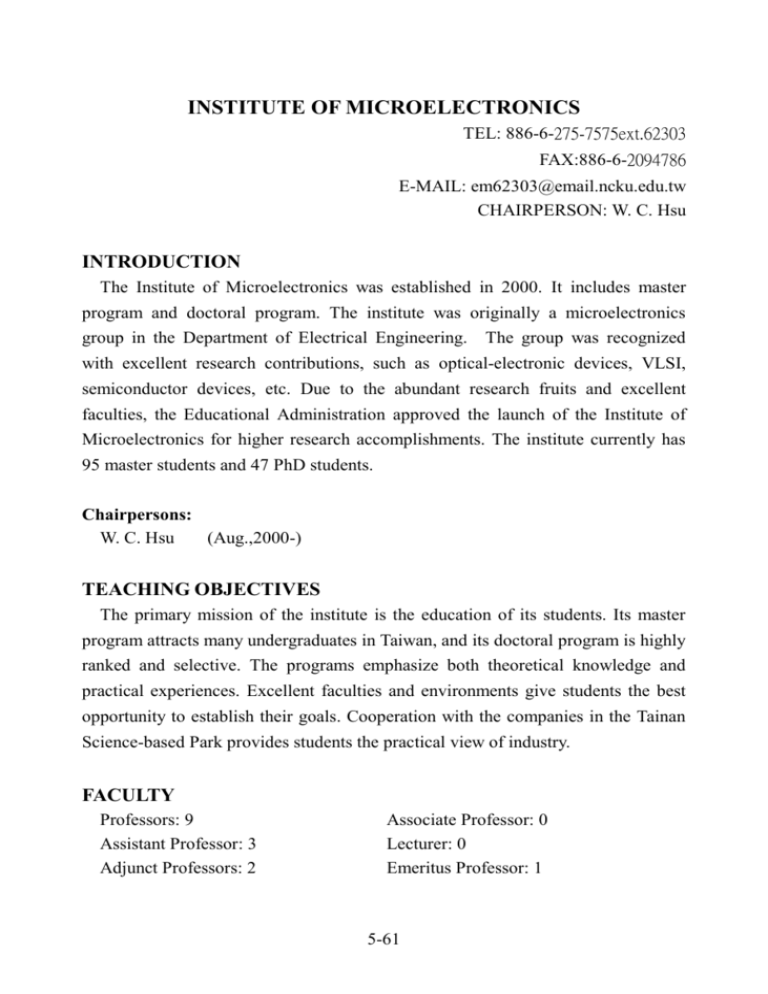
INSTITUTE OF MICROELECTRONICS TEL: 886-6-275-7575ext.62303 FAX:886-6-2094786 E-MAIL: em62303@email.ncku.edu.tw CHAIRPERSON: W. C. Hsu INTRODUCTION The Institute of Microelectronics was established in 2000. It includes master program and doctoral program. The institute was originally a microelectronics group in the Department of Electrical Engineering. The group was recognized with excellent research contributions, such as optical-electronic devices, VLSI, semiconductor devices, etc. Due to the abundant research fruits and excellent faculties, the Educational Administration approved the launch of the Institute of Microelectronics for higher research accomplishments. The institute currently has 95 master students and 47 PhD students. Chairpersons: W. C. Hsu (Aug.,2000-) TEACHING OBJECTIVES The primary mission of the institute is the education of its students. Its master program attracts many undergraduates in Taiwan, and its doctoral program is highly ranked and selective. The programs emphasize both theoretical knowledge and practical experiences. Excellent faculties and environments give students the best opportunity to establish their goals. Cooperation with the companies in the Tainan Science-based Park provides students the practical view of industry. FACULTY Professors: 9 Assistant Professor: 3 Adjunct Professors: 2 Associate Professor: 0 Lecturer: 0 Emeritus Professor: 1 5-61 Total: 15 Professors: Hsu, Wei-Chou Su, Yan-Kuin Houng, Mau-Phon (Ph.D., NCKU) MOCVD, Compound semiconductor devices, Optoelectronic devices (Ph.D., NCKU) Optoelectronic Devices, Microwave devices, Integrated Optics, Electromagnetics, Electromagnetic Wave. (Ph.D., NCKU) Semiconductor Lasers, VLSI package (Ph.D., NCKU) Semiconductor Physics, Compound Semiconductors. Molecular Beam Epitaxy Liu, Wen-Chau (Ph.D., NCKU) Electronics, Digital Electronics, Advanced Engineering Mathematics, Semiconductor Devices, Semiconductor Physics, Compound Semiconductors. Wang, Shui-Jinn (Ph.D., NCKU) Microelectronics, Semiconductor Physics and Simulation, SiGe Molecular Beam Epitaxy, Quantum Device Design and Fabrication Chang, Shoou-Jinn (Ph.D., University of California at Los Angeles) Optoelectronic Devices, Semiconductor Physics Lee, Ching-Ting (Ph.D., Carnegie Mellon University) Optoelectronic Semiconductor Devices, Integrated Optics Chen, Jone F. (Ph.D., University of California at Berkeley) Semiconductor Devices, ULSI reliability Tsai, Tzong-Yow Ph.D., University of Southern California Laser Engineering, Optoelectronics, Integrated Photonic Device Design, Simulation and Data Analysis Chuang, Ricky Wenkuei (Ph. D., University of California, Irvine) Wang, Yeong-Her 5-62 Compound Semiconductors Optoelectronic Devices, Integrated Optics, Fluxless Bonding Process for Photonics and MEMS Devices Packaging Adjunct Professors: Chen, J. R. Yokoyama Meiso Emeritus Professor: Wu, Tien-Shou (Ph. D., University of Chicago) Surface Science, Thin Film Engineering (Ph.D., Osaka University, Japan). Physics of Semiconductor, Electrooptic Engineering, Display devices, Microwave devices (Ph.D., Osaka University) Electrical Engineering Materials, Solid State Electronics, Semiconductor Materials & Devices, Thick Film Engineering, Electronic Ceramics LABORATORIES AND EQUIPMENT The library shared by the institute and the Department of Electric Engineering contains more than 70,000 volumes of reference books, 51,458 volumes in English and 18,647 volumes in Chinese, and more than 320 bound volumes of periodicals dealing with related subjects. The main teaching labs are: Thin Film Lab, EL Lab, and Semiconductor Devices Process Lab. The main experimental equipments include an Advanced Optoelectronic Technology Center, 2 Molecule Beam Epitaxial Growth Systems (MBEs), 3 Metal Organic Chemical Vapor Deposition (MOCVD) systems, Yellow Light Room, Measurement Room, High Frequency Measurement Room, etc. RESEARCH AND DEVELOPMENT Research in the Institute of Microelectronics serves two main purposes. The generation of new fundamental knowledge is a primary function. Of equal importance is the education of graduate students who participate in research and contribute to the advancement of knowledge through their thesis research. The 5-63 research programs provide facilities and support for graduate students and enable them to pursue their advanced study. Another important function of research is the continuing development of the faculty. A forward-looking undergraduate program depends upon the existence of a strong graduate program and the presence of excellent faculty who are leaders in their respective fields. Research in the Institute of Microelectronics at the National Cheng Kung University encompasses a broad spectrum of areas which reflect the wide range of interest and expertise of the faculty, as illustrated by the number and diversity of the research projects. Microelectronics: The microelectronics group works on the design and development of semiconductor devices. Current efforts are in the following topics: The study of GaAs based HEMT/HBT microwave device and circuit. The study of -SiC/Si high temperature optical-electronic device. Wafer bonding technology for optical interconnection. Microwave, opto-electronic components module and subsystems. High-speed semiconductor device. Investigation of high-performance InGaAsSb/InGaAs/InP integrated photo-receivers. Design and fabrication of capacitive pressure sensor and high Q RF inductor based on a low/high porosity porous silicon structure. The study of green organic light-emitting diode (OLED) structure. The investigation and fabrication of GaN optical and microwave device The investigation and fabrication of GaN blue and FET. Reliability of CMOS devices and circuits. InGaAsN long-wavelength laser CURRICULUM Master Courses: Minimum credits required for graduation: 5-64 24 and white light devices No. of credits for the thesis: 12 (Accounted separately) No. of credits for the specialized courses: no less than 24 Master seminar: 4 semesters Master Courses: Minimum credits required for graduation: 24. No. of credits for the thesis: 6. (Accounted separately) No. of credits for the specialized courses: no less than 24. Master seminar: 4 semesters. Yr. Course No. Course Title 1st N25031-1 1st 1st 1st N25030 N25050 N25060 1st 1st 1st 1st 1st 1st N25400 N25420 N25470 N25530 N25540 N25550 1st N25570 1st 1st N25580 N25590 1st Credits SemesterⅠ SemesterⅡ 3 N25970 Physics of Semiconductor Devices 1-2 VLSI Technology Basic VLSI Design Semiconductor Devices Modeling & Simulation Digital Signal Processing Microwave Circuit & Devices Laser Physics VLSI Devices Physics Advanced Solid State Physics Advanced Electro-optic Physics Lab Surface Characterization Technique Thin Film Engineering Electronic Materials Engineering Application Laser Technology 1st N25A20 Introduction to Optics 3 1st N27880 Semiconductor Photonics 3 1st N27810 Optoelectronic Display Devices 3 5-65 3 3 3 3 3 3 3 3 3 1 3 3 4 3 3 Physics and Technology 2nd N26030 2nd 2nd 2nd 2nd 2nd 2nd 2nd N26040 N26050 N26060 N26230 N26240 N26260 N26360 2nd 2nd N26370 N26530 2nd 2nd 2nd 2nd 1st N26550 N26560 N26830 N26840 Q16010 Compound Semiconductor Engineering Special Topics on Semiconductor Integrated Optics Optic-Electronic Engineering Lab Technical Writing Electromagnetic Noise Microprogramming Techniques Computational Aspects on VLSI Circuits VLSI Circuit Design Compound Semiconductor Devices Quantum Electronics Solid Thermodynamics VLSI Testing Theory IC Design for Testing Optoelectronic Semiconductor Physics and Devices 3 3 3 1 1 3 3 3 3 3 3 3 3 3 3 Doctor Courses: Minimum credits required for graduation: 18. No. of credits for the Thesis: 12. (Accounted separately) No. of credits for the specialized courses: no less than 18. Ph.D. seminar: 4 semesters. Yr. Course No. Course Title 1st N27020 1st 1st N27040 N27050 Credits SemesterⅠ SemesterⅡ Low-Dimensional Structural Component Surface Science Optic-Electronic Devices Physics 5-66 3 3 3 1st 1st 1st 1st N27060 N27090 N27300 N27330 1st 1st N27360 N27390 1st N27400 1st 1st N27410 N27420 1st N27450 1st 1st 1st N27540 N27550 N27560 1st 1st N27590 N27600 1st 2nd N28040 N28060 Solid State Dielectric Physics Microwave Integrated Circuits IV-IV Compound Semiconductor Negative Differential Resistance Devices Optic Electronics Semiconductor Processing Equipment and Automation Special Topics on Liquid Crystal Physics Electronic Package Techniques Single Crystal RF Microwave Integrated Circuits RF Microwave Communication Circuit Design High Speed Device Display Device Amorphous Si Optoelectronic Device Physics & Engineering Antenna Engineering Computer Network Performance Analysis Solid State Conduction Theory Semiconductor Laser 5-67 3 3 3 3 3 3 3 3 3 3 3 3 3 3 3 3 3
